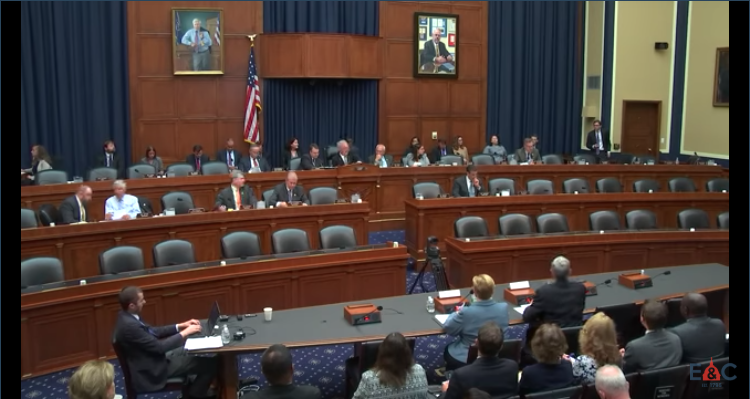This week the House Energy and Commerce Environment Subcommittee held a hearing on perfluorinated (PFAS) chemicals in the environment. Millions of people across the United States are exposed to drinking water contaminated by toxic PFAS chemicals.
PFAS, which stands for per- and polyfluoroalkyl substances, is a family of more than four thousand chemicals that are used as grease-proofing and waterproofing agents. They are used in firefighting foam, food packaging, non-stick pans, clothing, building materials and manufacturing processes. While the most notorious of these “forever” chemicals, PFOA and PFOS, have been phased out of manufacturing in the U.S., their legacy of contamination persists. The chemical industry, meanwhile, has introduced thousands of newer chemicals in the same toxic “family,” such as a chemical known as GenX, continuing to put public health at risk.
In an oversight hearing, the committee heard from Dr. Peter Grevatt from the U.S. EPA’s Office of Water, and Maureen Sullivan, the Deputy Assistant Secretary of Defense for Environment from the U.S. Department of Defense. Concerns were raised on both sides of the aisle about how much the federal government is doing to mitigate the contamination of water systems.
Our partner Erik Olson of the Natural Resources Defense Council testified about the dangers of PFAS and asked that a letter to the committee organized by Safer Chemicals Healthy Families and endorsed by 51 local, state, and national organizations be entered into the hearing record. His testimony began by stating the breadth of the problem:
PFAS are the new PCBs—but they may be more widespread and dangerous. They are toxic at extremely low, parts per trillion levels. They don’t break down and have become ubiquitous in the environment. Just two of them (PFOA and PFOS) are present in more than 6 million Americans’ tap water at unsafe levels, according to a Harvard study. Considering recent data showing that extremely low levels of these compounds and an array of other PFAS are harmful, it is likely that tens of millions of U.S. residents may have unsafe PFAS levels in their tap water. Indeed, PFAS are now found in the bodies of more than 98% of Americans—probably in every one of you, your families, and your constituents.
Members on both sides of the aisle recounted stories of contamination in their own communities – from Michigan Reps. Fred Upton (R) and Debbie Dingell (D) to New Jersey Rep. Frank Pallone (D), and North Carolina Rep. Richard Hudson (R) whose district includes Fayetteville where the residents have been affected by the PFAS chemical GenX in their drinking water.
One southeastern North Carolina resident, Emily Donovan, co-founder of Clean Cape Fear, gave heart-wrenching testimony about how the presence of perflourinated chemicals in her local drinking water may already be impacting her family and friends:
I am here to testify that Wilmington and Fayetteville area residents are already showing signs of obscure and rare cancers, immune disorders and diseases in populations far too young to pass off as normal.
How many of your friends are battling cancer? I’m 41 and my friend Sarah is battling stage three colon cancer. My friend Tom has terminal brain and bone cancer. My friend Kara, an Operation Iraqi Freedom veteran, has stage three breast cancer and had her gallbladder stop working. My friend Margaret has a rare bone cancer. And my friend Robert has leukemia and bladder cancer. And my own husband had a benign brain tumor and almost lost his eyesight. I’m frightened.
“It’s time to figure out what can be done right now and what needs to be done to respond appropriately to legitimate risks created by PFAS contamination in the environment,” said Subcommittee Chairman John Shimkus (R-IL).
Carol Isaacs, who directs the Michigan PFAS Action Response Team, began by reminding the committee that PFAS is not just a Michigan problem, but a national issue. Ms. Isaacs made a very compelling case for federal agency coordination and assistance for all states, including funding for Department of Defense for remediation of contamination from military installations.
Safer Chemicals Healthy Families looks forward to further work with our coalition partners and with Congressional offices to identify and support solutions to address the PFAS crisis.





